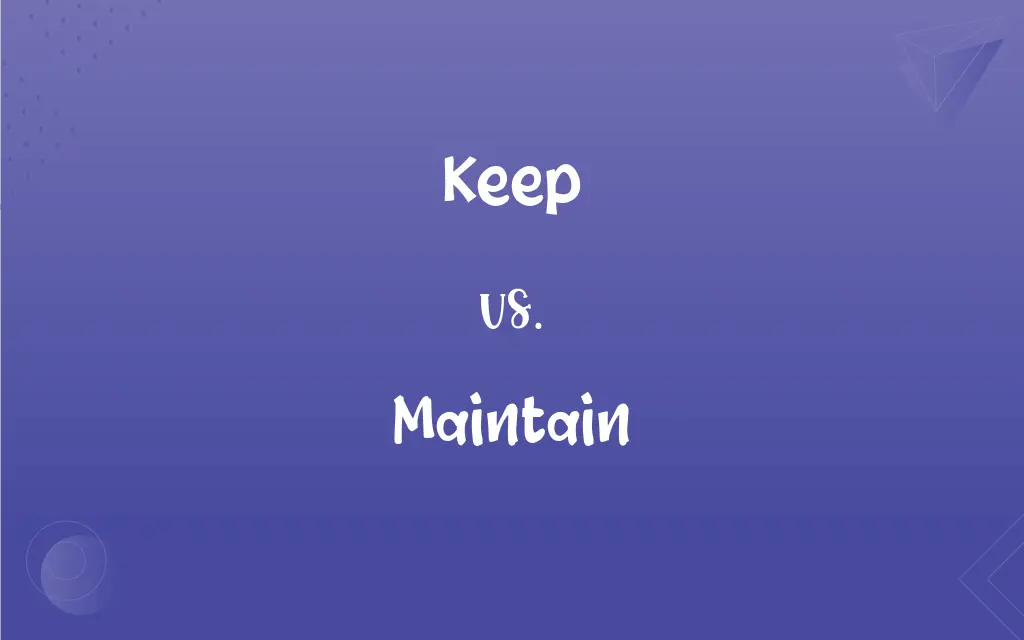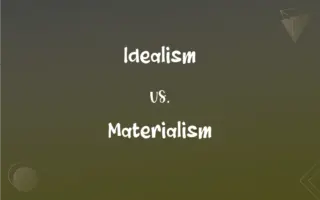Keep vs. Maintain: What's the Difference?
Edited by Aimie Carlson || By Janet White || Published on December 10, 2023
"Keep" implies holding or retaining something in its current state, whereas "maintain" suggests actively working to ensure something remains in a specific condition or continues operating as intended.

Key Differences
"Keep" often refers to the state of holding or retaining something without much change, suggesting possession or continuity. In contrast, "maintain" implies a more active role, involving efforts to sustain or uphold a condition, often requiring action or intervention.
When we "keep" something, we are preserving it as it is, like keeping a secret or a promise, which involves no change to the state of the secret or promise. Conversely, to "maintain" something, like a garden or a relationship, requires ongoing effort and action to ensure its continued existence or quality.
"Keep" can also imply compliance or adherence, as in keeping to a schedule, where the focus is on not deviating. "Maintain," however, often involves the idea of keeping something at a certain level or standard, such as maintaining a certain grade in school, which requires active effort.
In a physical sense, "keep" can refer to storing or housing something, like keeping tools in a shed, where the tools remain passive. In contrast, "maintain" is used when there is an active role in preservation, like maintaining machinery, which involves regular checks and repairs.
"Keep" can suggest continuity over time, such as keeping a diary, which is an ongoing process but often passive. On the other hand, "maintain" suggests not just continuity, but also quality control, like maintaining one's health, which requires consistent and active involvement.
ADVERTISEMENT
Comparison Chart
Nature of Action
Passive retention
Active effort
Involvement
Minimal or no intervention required
Regular intervention needed
Context
Often used for objects or promises
Commonly refers to conditions, states
Duration
Implies long-term holding
Suggests ongoing, consistent effort
Example Usage
"Keep a diary"
"Maintain a car"
ADVERTISEMENT
Keep and Maintain Definitions
Keep
Adhere to a path or practice.
Keep to the left on the road.
Maintain
Keep in good repair
Maintain your car regularly.
Keep
Retain possession.
Keep the receipt for your records.
Maintain
Continue at a specified level
Maintain a steady pace in the race.
Keep
Continue a specific state.
Keep quiet during the movie.
Maintain
Preserve in an existing state
Maintain a clean house.
Keep
Preserve or protect.
Keep the leftovers in the fridge.
Maintain
Assert or declare
Maintain your innocence in the debate.
Keep
Remain in a specified condition.
Keep safe during your travels.
Maintain
Support or uphold
Maintain your strength with a healthy diet.
Keep
To retain possession of
Kept the change.
Must keep your composure.
Maintain
To keep up or carry on; continue
Maintain good relations.
Keep
To have as a supply
Keep spare parts in case of emergency.
Maintain
To keep in an existing state; preserve or retain
Maintain one's composure.
FAQs
Can "keep" involve active effort?
Usually, "keep" involves less effort, focusing on retaining or holding something.
Does "maintain" imply long-term involvement?
Yes, "maintain" often implies long-term, ongoing involvement or effort.
Can "keep" imply a change?
No, "keep" generally implies retaining the current state without change.
Is "keep" used in legal language?
Yes, "keep" is used in legal contexts, often related to possession or compliance.
Can "maintain" be used in emotional contexts?
Yes, "maintain" can be used for emotional states, like maintaining calm.
Can "maintain" refer to beliefs or opinions?
Yes, "maintain" can be used to express holding or defending beliefs or opinions.
Does "keep" imply responsibility?
"Keep" can imply a responsibility to retain or hold onto something.
Can "keep" be used in a protective sense?
Yes, "keep" can imply protection, as in keeping someone safe.
Is "maintain" always about physical objects?
No, "maintain" can refer to physical objects, relationships, or conditions.
Is "maintain" related to upkeep?
Yes, "maintain" is often related to the upkeep or care of something.
Can "keep" refer to physical storage?
Yes, "keep" can refer to storing or housing something.
Is "keep" suitable for describing active processes?
Generally, "keep" is less about active processes and more about static states.
Does "maintain" imply a standard or level?
Yes, "maintain" often implies keeping something at a certain standard or level.
Can "maintain" mean to argue for something?
Yes, "maintain" can mean to assert or argue in favor of something.
Can "keep" mean to continue?
Yes, "keep" can mean to continue in a state, action, or condition.
Does "keep" imply permanence?
"Keep" can imply a long-term state, but not necessarily permanence.
Does "maintain" require skill or knowledge?
Sometimes, "maintain" can require specific skills or knowledge, especially in technical contexts.
Is "maintain" used in technical contexts?
Yes, "maintain" is commonly used in technical contexts for upkeep and care.
Is "keep" often used in casual language?
Yes, "keep" is commonly used in everyday, casual language.
Is "maintain" used in relationship contexts?
Yes, "maintain" can be used to describe efforts in sustaining relationships.
About Author
Written by
Janet WhiteJanet White has been an esteemed writer and blogger for Difference Wiki. Holding a Master's degree in Science and Medical Journalism from the prestigious Boston University, she has consistently demonstrated her expertise and passion for her field. When she's not immersed in her work, Janet relishes her time exercising, delving into a good book, and cherishing moments with friends and family.
Edited by
Aimie CarlsonAimie Carlson, holding a master's degree in English literature, is a fervent English language enthusiast. She lends her writing talents to Difference Wiki, a prominent website that specializes in comparisons, offering readers insightful analyses that both captivate and inform.






































































